We may not have the course you’re looking for. If you enquire or give us a call on 01344203999 and speak to our training experts, we may still be able to help with your training requirements.
Training Outcomes Within Your Budget!
We ensure quality, budget-alignment, and timely delivery by our expert instructors.
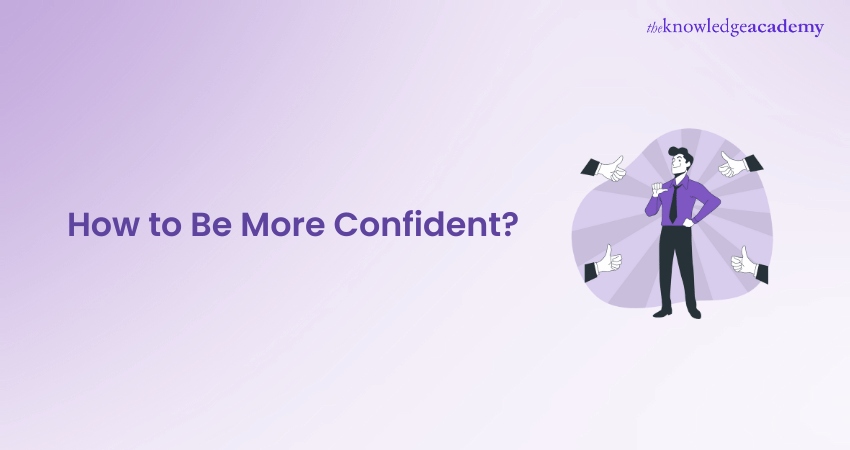
Struggling with self-doubt and low self-esteem? You’re not alone—many people face challenges in building their Confidence. Imagine a life where you feel assured in every situation, from social interactions to professional opportunities. Learning How to be More Confident can transform your personal and professional life.
Explore our blog for practical tips and strategies to elevate your self-esteem. Discover actionable advice on self-discovery, cultivating a positive mindset, and effective methods on How to be More Confident. Don’t let self-doubt limit your potential—begin your journey to greater Confidence and success today!
Table of Contents
1) What is Confidence?
2) Tips for Being More Confident
3) Why is Confidence Important
4) What Can Cause a Lack of Confidence
5) Conclusion
What is Confidence?
Confidence is a strong belief in yourself and your abilities. It drives you to take bold actions and stay resilient when facing challenges. This quality goes beyond just feeling sure of yourself; it involves understanding your strengths and accepting your vulnerabilities.
Confidence comes from a positive view of yourself. It means recognising your achievements while staying humble. At its heart, Confidence is a mindset that shapes how you approach life. It’s not about being boastful or perfect. Instead, it’s about trusting your ability to handle uncertainty and learn from experiences. This self-trust helps you set goals, overcome obstacles, and keep going towards your dreams.
Confidence shows in how you present yourself, communicate, and deal with setbacks. It’s a journey of self-discovery and growth, shaped by reflection, positive feedback, and embracing challenges. Ultimately, Confidence helps you unlock your full potential and succeed in different areas of life.
Tips for Being More Confident
Now that we understand why Confidence is important let’s learn a few tips to unlock your Confidence. Here is a list highlighting various methods how you can practice enhancing your Confidence level:
1) Enhance Your Self-talk
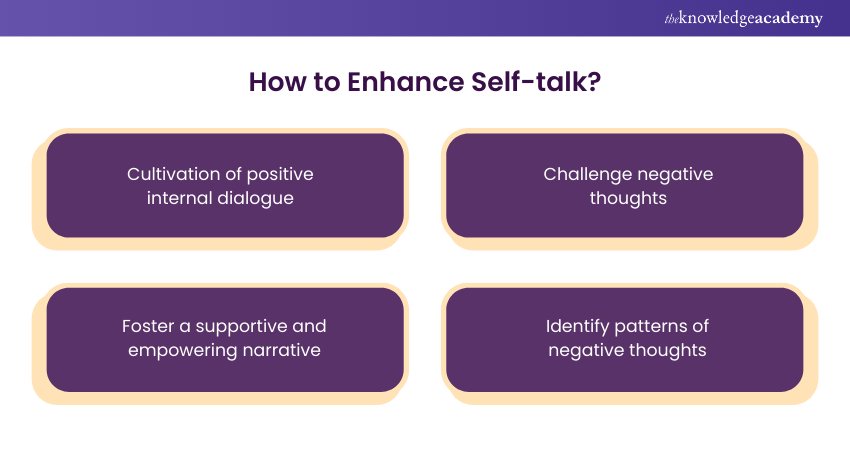
Cultivate a positive internal dialogue by challenging negative thoughts and replacing self-doubt with affirmations. Focus on your strengths to foster a supportive and empowering narrative, boosting confidence and resilience. Identify patterns of negative thinking, counter them with rational responses, and redirect your focus to your strengths.
Integrate affirmations into your daily routine to reinforce positive beliefs. Celebrate your achievements to nurture a resilient and uplifting internal dialogue.
2) Alter Your Perspective
Adopt a more optimistic viewpoint by embracing difficulties as opportunities for growth and viewing obstacles as lessons. Always seek the positive side of situations and develop a sense of gratitude to enhance strength and positivity. Broaden your outlook by actively seeking diverse perspectives and engaging in meaningful discussions that show empathy and value different viewpoints.
Embrace change as a vital part of growth, seeing challenges as catalysts for personal advancement. Shift your focus from obstacles to solutions, fostering creativity and resilience in navigating life’s unexpected turns.
3) Cultivate Gratitude
Nurture gratitude by reflecting daily on positive aspects of your life. Keep a gratitude journal to acknowledge small joys and express appreciation to others. Embrace challenges as lessons to foster resilience and a positive mindset.
Additionally, integrate mindfulness practices into your daily routine to foster gratitude. Embrace present moments and savor the richness of experiences.
Extend genuine appreciation to others, fostering positive connections. Maintain a gratitude journal to capture moments of joy, resilience, and growth. Actively cultivate thankfulness, weaving it into your mindset and amplifying its transformative impact on your overall outlook.
4) Embrace Power Poses
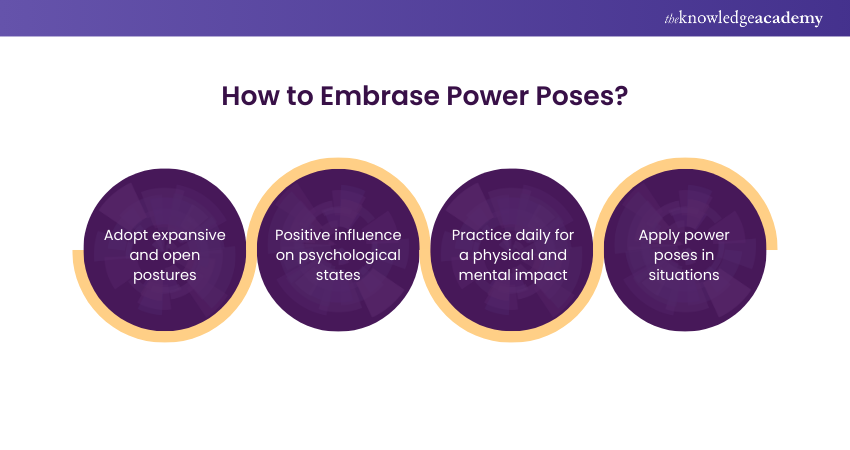
Embracing power poses is a tangible way to enhance confidence and assertiveness. Research suggests that adopting expansive, open postures can positively influence hormone levels and psychological states.
To incorporate power poses into your routine, start with the classic “Wonder Woman” or “Superman” stance, standing tall with shoulders back and chest open. Spend a few minutes daily in these poses to feel the physical and mental shift. Use power poses before important meetings or presentations to boost your self-assurance and presence.
5) Recall Past Successes
Harnessing the power of past successes is a potent strategy for boosting confidence. Create a success inventory with a detailed list of achievements, both big and small. Regularly revisit this inventory to vividly recall the positive emotions associated with each success.
In moments of self-doubt, redirect your focus to this catalogue of triumphs. Reflect on the skills and strengths that led to those accomplishments, reinforcing your capabilities. Use these memories as motivation, proving to yourself that you possess the resilience and competence to overcome challenges.
6) Employ Goal Visualisation
Visualising goals is a powerful method for achieving success. Start by clearly outlining your objectives and dividing them into achievable tasks. Find a peaceful area to practice visualisation, closing your eyes and vividly picturing the accomplishment of each step and the main objective.
Utilise all your senses while mentally practicing, including visualising, hearing, and feeling the emotions connected to achievement. Picture the challenges that may arise and envision yourself facing them with determination.
7) Maintain Eye Contact
Maintaining eye contact is a key element of effective communication and exudes confidence. Recognise the importance of eye contact in building connections and conveying attentiveness. Practice focusing on the other person’s eyes, avoiding distractions and looking away.
Establish a comfortable balance, neither staring intensely nor avoiding eye contact altogether. Cultivate a friendly and warm gaze, conveying sincerity and engagement. Practice active listening by maintaining eye contact during conversations, signaling your interest and understanding.
8) Establish Healthy Routines
Creating good habits is essential for both physical health and efficiency. Identify important areas in your life that could improve with regularity, such as rest, physical activity, and work. Establish a daily routine that sets aside specific time for each task.
Prioritise self-care by including activities that boost physical and mental well-being, such as regular exercise, healthy meals, and adequate rest. Consistency is essential, so make an effort to stick to your schedule, even on weekends.
Divide big goals into smaller, more achievable tasks and incorporate them into your daily schedule. This method encourages feelings of achievement and progress. Integrate periods of calmness and presence, either by practicing meditation, taking breaks, or engaging in hobbies.
9) Nourish Your Mind
Feeding your mind is crucial for overall health. Develop a varied reading routine, delving into literature that stimulates your mind and expands your viewpoints. Participate in ongoing education through online classes, seminars, or conversations with experienced colleagues.
Prioritise mental well-being through mindfulness activities like meditation and deep breathing techniques. Consistently engage your brain with puzzles, games, or creative activities that enhance cognitive flexibility and problem-solving abilities.
Develop valuable relationships and dialogues with individuals, promoting mental engagement and emotional health. Set aside time for self-reflection, giving your mind the chance to digest experiences and thoughts.
10) Acquire New Skill
Acquiring new skills is a dynamic and empowering journey. Begin by identifying areas of interest or professional development. Set clear, achievable goals and break them into manageable steps. Embrace diverse learning platforms, from online courses to workshops and hands-on experiences. Cultivate a curious mindset, seeking out resources and mentors to guide your learning journey.
Practice consistency and dedication, allocating dedicated time each day or week to skill development. Utilise feedback constructively, embracing a growth mindset that views challenges as opportunities to learn. Engage in hands-on application of skills through projects or real-world scenarios. Collaborate with others to gain varied perspectives and insights.
Partake in a new activity for your relaxation by signing up for our Hobbies & Interests Courses now!
11) Embrace the Present Moment
Embracing the present moment is a transformative practice for cultivating mindfulness and reducing stress. Begin by grounding yourself in your immediate surroundings, using your senses to connect with the present. Practice conscious breathing, allowing yourself to fully inhale and exhale, fostering a sense of calm.
Minimise distractions by focusing on one task at a time, fully immersing yourself in the experience. Acknowledge and release worries about the past or future, redirecting your attention to the current moment.
12) Celebrate the Small Victories
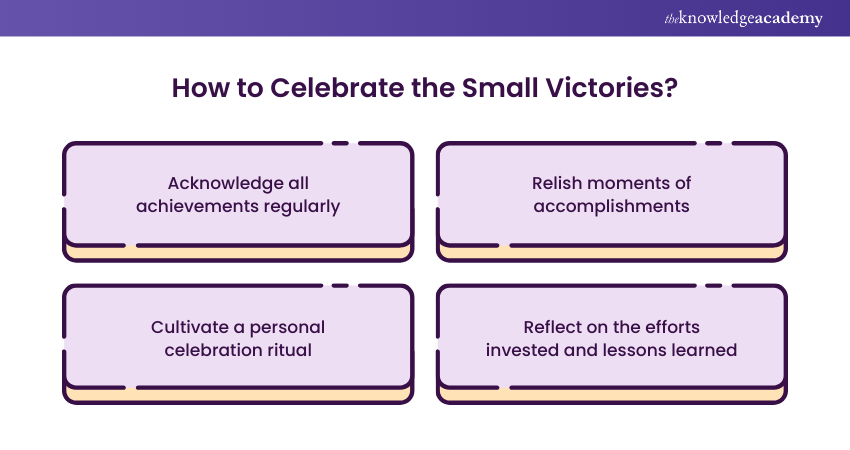
Celebrate the small victories as they accumulate into significant triumphs. Acknowledge your achievements, no matter how minor, and take a moment to relish the sense of accomplishment.
Create a personal celebration ritual, whether it's treating yourself to a favourite snack, journaling your success, or sharing it with a friend. Reflect on the effort invested and the lessons learned, reinforcing a positive mindset.
13) Avoid Passing Judgment on Others
Practice non-judgment by cultivating empathy and understanding. Recognise the complexity of human experiences, acknowledging that everyone has unique perspectives shaped by their journey.
Suspend assumptions and listen actively, seeking to comprehend rather than critique. Foster an open-minded attitude, appreciating diversity and embracing the richness it brings to interactions.
Challenge preconceived notions and strive for compassion, realising that each person's actions may be influenced by factors unknown to you. By consciously avoiding hasty judgments, you promote a culture of acceptance, deepen connections, and contribute to a more empathetic and harmonious social environment.
14) Master the art of Saying no
Achieving expertise in denying requests requires self-awareness and assertiveness. Prioritise your obligations and recognise your boundaries. Communicate clearly and briefly when politely and firmly declining.
Master the art of saying no without feeling guilty, prioritising your health and happiness. Establish limits and avoid taking on too many tasks, ensuring your efforts are focused on valuable goals.
15) Express Yourself Assertively
Expressing yourself assertively involves clear communication while respecting others. Clearly state your thoughts and needs using “I” statements to avoid blame. Maintain confident body language and eye contact to project self-assurance.
Practice active listening, acknowledging others’ perspectives while staying true to your own. Set boundaries firmly and diplomatically, ensuring your needs are met. Choose assertive language, avoiding aggression or passivity.
Learn to apply assertiveness in various scenarios by signing up for our Assertiveness Skills Training now!
16) Practice Active Listening
Practice active listening by giving your full attention, eliminating distractions, and making eye contact. Demonstrate engagement through non-verbal cues like nodding and affirming gestures.
Avoid interrupting and refrain from formulating responses while the other person speaks. Paraphrase or summarise their words to confirm understanding and show empathy. Ask open-ended questions to encourage further sharing.
17) Have Faith in Your Purpose
Cultivate self-belief by clarifying your values and aligning your actions with your true passions. Set meaningful goals that resonate with your purpose, creating a roadmap for personal and professional growth.
Embrace challenges as opportunities for learning and refinement, reinforcing your commitment to your purpose. Surround yourself with a supportive community that shares similar values and aspirations.
Reflect on past successes and positive feedback to build confidence in your capabilities. Trust the journey, acknowledging that setbacks are temporary detours on the path to fulfilling your purpose. By consistently nurturing faith in your purpose, you fortify resilience and sustain a sense of fulfillment.
18) Define Attainable Objectives
Set realistic, specific, and measurable goals. Consider your current capabilities and resources while establishing milestones. Break larger objectives into manageable tasks, creating a clear roadmap for success.
Prioritise goals based on their significance and alignment with your overall vision. Regularly reassess objectives, adapting them to changing circumstances. Seek feedback from peers or mentors to ensure feasibility.
Celebrate incremental achievements to stay motivated and focused. By defining attainable objectives, you foster a sense of accomplishment, maintain momentum, and lay the foundation for sustained success.
Devise solutions to achieve your goals by signing up for our Motivation and Goal Setting Training now!
19) Confront Your Fears
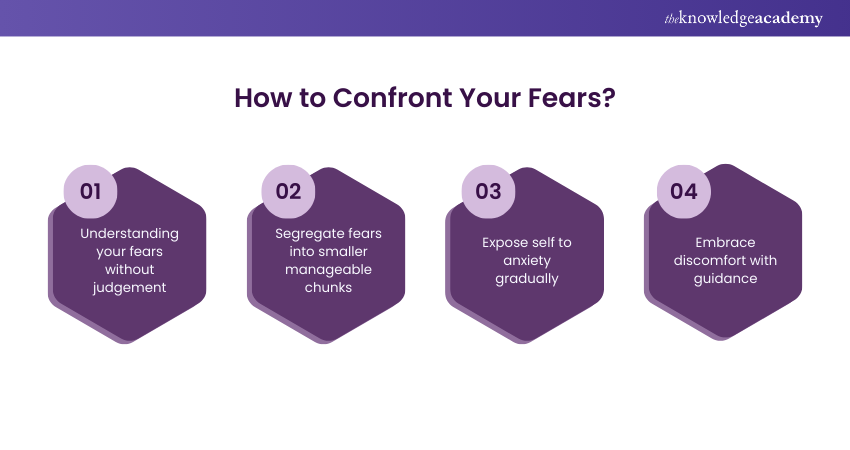
Confronting fears is a transformative process. Begin by acknowledging and understanding your fears without judgment. Break them down into smaller, manageable steps, gradually exposing yourself to the source of anxiety.
Cultivate a mindset that views fear as a natural part of growth, embracing discomfort as a catalyst for change. Seek support from friends, mentors, or professionals to navigate challenges.
20) Cultivate Self-love
Cultivating self-love is a daily practice. Start by acknowledging your worth, celebrating achievements, and embracing imperfections. Practice positive affirmations, reinforcing self-compassion and challenging negative self-talk.
Prioritise self-care routines, nurturing physical and mental well-being. Set healthy boundaries, valuing your time and needs. Surround yourself with positivity and supportive relationships. Regularly engage in activities that bring joy and fulfilment.
Why is Confidence Important?
Confidence is a key part of personal development. It significantly impacts the direction of your life. Confidence affects many areas, including mental health, how you communicate with others, career success, and your overall quality of life. Here’s a closer look at why Confidence is so important:
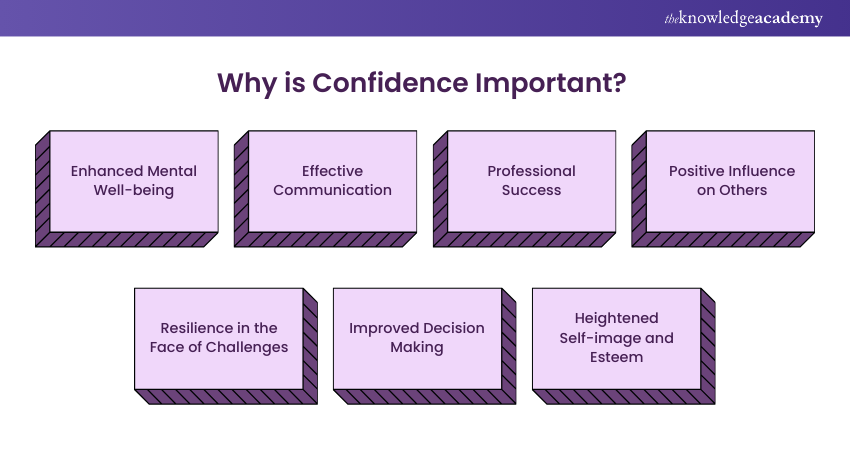
1) Enhanced Mental Well-being
Confidence acts as a buffer against self-doubt and helps Manage Anxiety, contributing significantly to mental resilience. A confident individual is more likely to confront challenges with a positive mindset, reducing stress and fostering emotional stability. This mental fortitude enables better-coping mechanisms and an increased ability to navigate life's complexities.
2) Effective Communication
Confidence is closely tied to effective communication. Those who exude Confidence are more likely to articulate their thoughts clearly, engage in assertive communication, and express their ideas with conviction. This skill is invaluable in personal relationships, professional settings, and social interactions, fostering understanding and cooperation.
3) Professional Success
In the professional domain, Confidence is often the differentiator between success and stagnation. Confident individuals are more likely to pursue ambitious goals, take calculated risks, and persevere in the face of setbacks. This proactive approach enhances leadership qualities, decision-making abilities, and overall performance in the workplace.
4) Positive Influence on Others
Confident individuals inspire those around them. Their self-assured demeanour encourages others to trust their capabilities and follow their lead. Whether in a leadership role or within a social group, Confidence has a contagious effect, creating a positive and empowering environment.
5) Resilience in the Face of Challenges
Life is replete with challenges, and Confidence serves as a shield against adversity. Confident individuals view setbacks as opportunities for growth rather than insurmountable obstacles. This resilience enables them to bounce back from failures, learn from experiences, and persist in the pursuit of their goals.
6) Improved Decision Making
Confidence is intrinsically linked to self-trust, a crucial component in making sound decisions. Confident individuals are more likely to trust their instincts, weigh options effectively, and make decisions without succumbing to indecision or fear. This decisiveness is a valuable asset in both personal and professional spheres.
Equip yourself with the techniques to make better decisions by signing up for our Decision Making Skills Course now!
7) Heightened Self-image and Estee
Confidence contributes to a positive self-image, fostering a healthy sense of self-esteem. When individuals believe in their abilities and accomplishments, they are more likely to view themselves positively. This self-affirmation forms the foundation for a fulfilling and contented life.
What Can Cause a Lack of Confidence?
A lack of confidence can be caused by various factors, including:
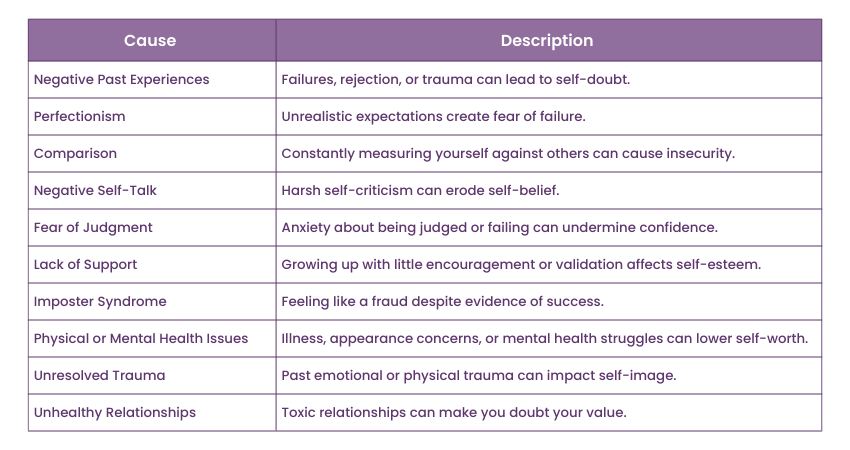
Conclusion
Learning How to be More Confident involves understanding your strengths, setting achievable goals, and embracing both successes and failures. By focusing on self-discovery and maintaining a positive mindset, you can build a lasting Confidence that enhances all areas of your life. Start taking steps today to unlock your full potential and discover How to be More Confident in every situation.
Recognise your strength and expand your comfort zone by signing up for our Confidence Building Training now!
Frequently Asked Questions

Body language significantly impacts how confident you appear and feel. Positive body language, like standing tall and making eye contact, can boost your self-esteem and influence how others perceive you. It helps convey assurance and can enhance your overall Confidence.

For building Confidence, consider "The Confidence Code" by Katty Kay and Claire Shipman and "Daring Greatly" by Brené Brown. Both offer practical strategies and insights into developing self-assurance. Additionally, online courses and TED Talks on Confidence can be valuable resources.

The Knowledge Academy takes global learning to new heights, offering over 30,000 online courses across 490+ locations in 220 countries. This expansive reach ensures accessibility and convenience for learners worldwide.
Alongside our diverse Online Course Catalogue, encompassing 17 major categories, we go the extra mile by providing a plethora of free educational Online Resources like News updates, Blogs, videos, webinars, and interview questions. Tailoring learning experiences further, professionals can maximise value with customisable Course Bundles of TKA.

The Knowledge Academy’s Knowledge Pass, a prepaid voucher, adds another layer of flexibility, allowing course bookings over a 12-month period. Join us on a journey where education knows no bounds.

The Knowledge Academy offers various Personal Development Courses, including Confidence Building Training, Time Management Training, and Stress Management Training. These courses cater to different skill levels, providing comprehensive insights into the Benefits of Self-Confidence.
Our Business Skills Blogs cover a range of topics related to Personal Development, offering valuable resources, best practices, and industry insights. Whether you are a beginner or looking to advance your Personal Development skills, The Knowledge Academy's diverse courses and informative blogs have got you covered.
Upcoming Business Skills Resources Batches & Dates
Date
 Confidence Building Training
Confidence Building Training
Fri 3rd Jan 2025
Fri 7th Mar 2025
Fri 2nd May 2025
Fri 4th Jul 2025
Fri 5th Sep 2025
Fri 7th Nov 2025







 Top Rated Course
Top Rated Course



 If you wish to make any changes to your course, please
If you wish to make any changes to your course, please


